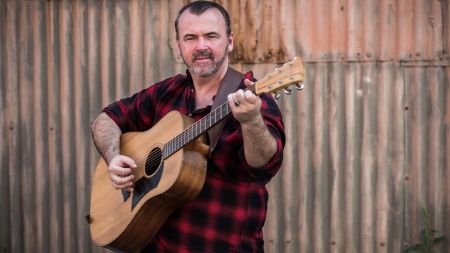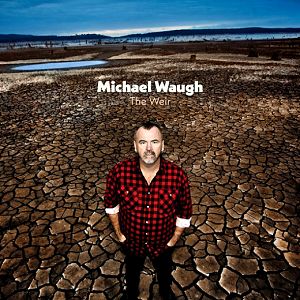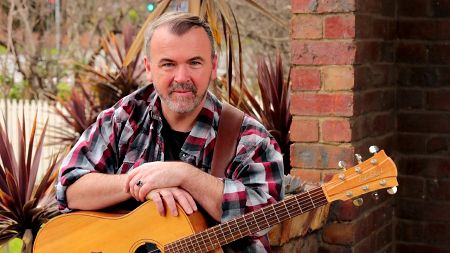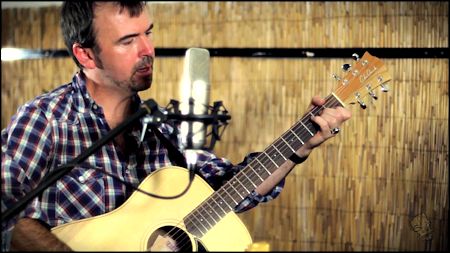DAVE'S DIARY - 30 SEPTEMBER 2019 - MICHAEL WAUGH CD REVIEW
2019 CD FEATURE
MICHAEL WAUGH
THE WEIR (COMPASS BROTHERS-UNIVERSAL)
DAIRY FARMER'S SON MICHAEL WAUGH REFLECTS DROUGHT AND FLOODS
“Remember that awful drought/ when the weir dried up and we took the Fairlane out/ drove across the dried up mud/ to the rotten farm house that stood there before the flood/ and I wonder how many summers I'd swam/ over that roof not knowing what lies beneath/ I wonder how many people there will be / skimming rocks over ghosts/ at the places I used to be.” - The Weir - Michael Waugh.
 |
Gippsland dairy farmer's son Michael Waugh is well qualified to write and sing about extremities of drought and flood that have haunted agrarians for centuries while corporate city bullfrogs croaked and choked on the bones in pursuit of a quick killing.
It all started for the latter day academic-secondary school teacher and house master in the environs of the Glenmaggie dam near Maffra that was the lifeblood of generations of dairy farmers like the Waugh family.
But Waugh escaped being a slave to weather by heading west to Deakin University and the green, green grass of his home at Scotch College near the Yarra River in Hawthorn.
As a media teacher and student of the diverse denizens that he encounters in his dual careers he had fertile fuel for his third album The Weir produced by Queensland refuge and singer-songwriter Shane Nicholson.
It's no surprise Waugh's attention to detail from his back and forward pages has credible clout in a mass media age where trivia is the strong suit of faddists and fashion fuehrers.
So let's start at the Weir that was down to 13% capacity when Waugh recorded this dynamic disc up north at Copacabana on the NSW Central coast in the height of the summer of 2018-2019.
Yes, not far from where former Geelong trucking troubadour Adam Harvey hangs his hat in the “People's Republic of Batteau Bay.”
The Weir reaches back to his childhood where he dropped his change into the Guide Dog collection box after buying a creaming soda, unforgettable pies and custard tarts from the Maffra bakery.
Then there's graduation to drinking Brandivino, riddling no shooting signs with bullets and being towed on a tractor tyre by a speed boat.
Next Waugh dives a little deeper into the murky depths over a roof of a long-submerged house now haunted by ghosts of the distant past and childhood memories of his mother trying to defend the family home from floods with a mop and broom.
It's a climatic contrast to the drought decimating family farming peers further east in Gippsland and north west Victoria and way out west in NSW and Queensland .
This is not pop and rap where reality is replaced by feral fantasies of manufactured puppeteers and ponces.
The title track segues into Big Things - another historic homily resurrecting rural refugees' memories of a life in the slow lane with eyes peeled.
“Big Things takes us on a family car trip to see the big things of Australia ,” Waugh explained of road journeys when the family could afford the petrol and tyres.
“It's meeting our country from the backseat of a car, dad trying to do a U-turn with a caravan in tow, and mum trying to read a road map upside down. It is fires that rip through Newry, the Macalister river bursting its banks, the casserole dishes brought by neighbours and a big skyrocket at the Lion's Park. It is about the things which you don't realise are big until you see them from a different perspective.”
Equally memorable is Waugh's video.
“Big Things is about family - and the making of this video was a real family affair,” Waugh explained.
“My good friend Miguel Rios shot and directed - assisted by his partner, Meredith O'Shea. Though, the real stars are Meredith and Miguel's kids. My favourite moment in the shoot was when Meredith gave them the direction to ‘look sad like an orphan for mummy'. I was rolling around on the ground laughing too much for the kids to adopt the required look of abandonment.
“The concept was about these kids recreating the family car trip to see the big things of Australia . They use whatever is at hand - coat hangers become the harbour bridge, the fruit bowl raided to create the big banana, teddies duct taped onto the couch to be back seat passengers. Like the goldfish, temporarily displaced so the bowl can be used as an astronaut helmet, two little kids swim around the house - playing out the memory of that family trip. Because in another part of the house there are other big things happening.”
COUNTDOWN AND MOLLY MELDRUM'S RUBBISH
“This song reminds me of sleeping bags in living rooms/ whispers after lights out, boys/ trying not to laugh too loud/ making heaps of noise/ I couldn't sing you all the words/ name the bands that sang that tune.” - This Song Reminds Me - Michael Waugh.
 |
Grandfather Waugh, 48, combines physical fitness and acute observational powers by ending tutorial tales as he mounts his push bike and pedals west from leafy Hawthorn to the historic and recently gentrified ghettos of Richmond . It's an admirable and rewarding pursuit for a cyclist dodging car jackers and home invaders to seek wisdom from a chance encounter with a fellow Gippsland born music historian Molly Meldrum. Orbost born and Quambatook raised Countdown icon Molly now hangs his many hats in and out at his Luxor mansion in Richmond. |
But it was not the wall murals of the St Kilda football team or Melbourne Storm that adorn the street façade of the home where Molly, now 73, fell from grace and a roof that caught Waugh's saddle viewing station.
“So, while cycling, singing the 46th list of Australia's rock royalty, and trying to avoid being hit by a truck I waited for a sign,” Waugh revealed of the source of This Song Reminds Me.
“And then, it happened. Molly Meldrum stepped out of his Richmond home to collect his garbage bins!
Surely this was an epiphany from The Countdown Gods, heralding that I should do myself a favour and keep this particular version of the lyrics. I do a great deal of song-writing on bikes. While it's sometimes hard to hold a guitar and steer This Song Reminds Me was written while pedalling through the inner Melbourne suburb of Richmond . This song's chorus and outro include a list of Australian artists who have inspired me; bands whose songs are like time machines - they take me to times and places and relationships that were. Theirs are the voices that remember me - even when I've forgotten those parts of myself. Their songs remind me of being young, partying, being drunk, being heartbroken, being in love, of best mates, of my farm, of radio on long country drives. Their songs have followed me through my life. They are the soundtrack to where I've been. But I had written about 45 variations of this list of Aussie legends - because our country has a rich tradition of music that defines us, too many to name in one song. And I wanted to get it right!”
It's salient sequencing that finds Mary Lou following the Molly memorial.
“ Mary Lou is another version of childhood and music but different and darker,” Waugh recalled.
“It was certainly a lot harder to write. What makes this so personal is the sense of embarrassment that I still feel about that incident. Essentially I was in pre-school and dancing around the lounge room when my friend's father called me Mary Lou . At first I was confused until I saw the look of embarrassment on my father's face and I realised that there was something not right with dancing. I never wanted to see that look on my father's face again so I just shut down that part of myself.”
DOWN IN THE VALLEY
“When I was at school we took a bus through the town/ deep, deep down in the valley/ and we saw how a crane took the coal from the ground/ somewhere deep, deep down/ and we saw how the sky grew dirty and black/ when we picnicked down by the cooling stack.” - Down In The Valley - Michael Waugh.
 |
Waugh embellishes observations of life in the Latrobe Valley in east Gippsland for a quartet of geographical gems at that begins with the fraternal Search Party , segues into Down The Valley, paternal pain of Warragul Police and Seaspray.
Writing about brothers and siblings has been a staple of Waugh's songs since his debut disc What Might Be and award winning second album The Asphalt And The Oval.
Search Party begins as a serious tome about reasons why a brother might head into the bush while a raft of mates, family and altruistic volunteers trek through the scrub in pursuit.
The punchline is the happy ending where the errant escapee is found after taking his retreat for an innocuous nature calling pit-stop.
Down In The Valley explores the resurrection of displaced timber workers, coal miners and farmers who rise above their plight despite educationally and poverty-challenged inter-generational families.
Waugh personalises history repeating for a rebellious rural lad chancing his adolescent penchant for taking on small town temptations and testing fate in Warragul Police .
It reflects the perils of parents in any country town where a teenager chances his arm on graffiti and smoking dope until the boys in blue knock on the door with news of a serious accident.
“It is not my story, nor is it the story of anyone that I know,” Waugh told me.
“I happened to be driving around Warragul when the news item came on about a boy who was the same age as my son, dying in a car accident. I imagined that moment when the police came to the door. I projected a bit about the rollercoaster ride that my son was going through (still is going through) so it is my story in as much as it is my little tearaway that I refer to in the first and second verses. The final verse and chorus is me reaching out to that man in Warragul that I've never met, and imagining the shadows coming up to the fly screen door and the moment where everything turned to scrambled eggs. It's a song that took me two or three years to write, because I wanted to be sure that I got it right. I don't know if I did or not.”
Waugh reflects a pleasant flashback to escaping reality for leisure on the ocean shores with music memories the soundtrack in Seaspray and the maturing of love in his own marital life in Like I Used To .
ANTHEMS AND PATRIOTS
“In 1901 they passed a law/ a 50-word dictation test to keep them from our shores/ because we didn't want illiterates or blacks/ and if you only wrote in Mandarin, we'll have to send you back.” - 50 Words - Michael Waugh.
 |
Waugh explores nationalism, exposed in the White Australia policy of days of yore, being reborn as a Trump like faux wall by Clive Palmer, Pauline Hanson and their puppets in 50 Words .
But Waugh is a messenger who remains a fast moving and elusive target as he honours his heritage.
“The song is about my national anthem and the story of how we were federated as a country” Waugh explained.
“Like the rest of the album this song about growing up Australian. I don't speak on stage or sing about my political opinions. However, there are great examples of by bands like Redgum and Goanna who have inspired me with this song. I write it as a way of remembering who we were and a way of dreaming about who we might be. It's by far the oldest song on the album. I wrote it on Australia Day in 2001. I'd like to think this song is not necessarily looking back and berating ourselves for who we were, but kind of dreaming in a positive way about who we might be. The last lines in the song are about ‘advancing Australia fair' and I think we can because I believe in us and I deeply love being Australian. I'm not a politician. I'm just a person who's hearing and thinking and feeling the same things that everybody else.”
Waugh activates dual roles as schoolteacher and songwriter to provoke thought and discussion and leave analysis to listeners.
And, unlike Midnight Oil singer Peter Garrett, he hasn't tripped on his tongue by being a politician in the Senate shark pool.
But he has added a modern caveat to expedite further discussion - “and I wonder if the Koori mob discussed/ borderline protection from white boat people like us/ and I wonder if they'd choose to send away/ someone who can't spell treaty for 200 years of shame.”
Waugh shares his heritage of dairying and playing football and music as a teenager with indigenous rural team-mates with this writer from way out west on the Shipwreck Coast .
It segues into Born Here.
“This song deliberately follows 50 Words ,” Waugh added.
“It tells another part of the same story that I started telling in that song. I'm deeply proud to have been born here. I am deeply nationalistic - but nationalism doesn't necessarily have to be about loving my country to the exclusion of being humanitarian.”
That fierce pride extends to his finale - Last Drinks.
“ Last Drinks is about my love for my son and family and it tells how the weir was built,” Waugh revealed. “Poor Irish migrants to the area (my great grandparents) had their farms bought in the 1920s by the state government in a forced acquisition of land. Being the fiery people they were, they refused to leave - and stayed on the land as the weir was built. Legends has it that the last of them held out at the Glenmaggie Hotel and when the inevitable flood came and the water finally inundated the bar, the bartender called last drinks.”